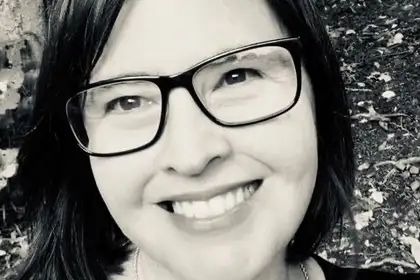
Senior Lecturer in Linguistics Dr Julia de Bres says it’s really important to her the work she undertakes in the rainbow and takatāpui spaces closely involves these communities and advances community goals.
Dr de Bres is a critical sociolinguist specialising in how language is used in the reproduction of social inequality.
“I analyse drawings, interviews and media texts to examine how people advance their personal interests through discourse and particularly how minority groups discursively resist imbalances of power.”
Currently, she is researching discourses relating to parents of transgender children.
“For this research, I have been interviewing parents of trans kids in Aotearoa and asking them to draw their experiences. This has provided rich visual and verbal depictions of gender-affirming parenting, drawing from the intersectional perspectives of Māori, Pākehā, Pasifika, queer, female, male and trans parents.”
“One of my favourite things about this project is that it shows the joy parents experience raising a transgender child. There is a history of pathologising research on parents of trans kids and contemporary social debates often dehumanise trans young people and their families, causing high levels of distress,” she says.
However, Dr de Bres says family support has a hugely positive impact on trans children and her research shows that family members’ lives are also enriched by the experience of raising a trans child.
“The trauma parents and children encounter does not derive from a child’s gender diversity but from the reactions of others, including schools, healthcare providers and wider family. This is where we need to do more work as a society: creating supportive spaces where trans young people and their families can thrive together,” Dr de Bres says.
She’s part of several minority groups and her family and friends are part of several others, and she sees how they all have to constantly fight different and interconnected social systems that only work for the majority.
“I believe that research into how these systems get reproduced via language is vital, as this can also open our eyes to ways to challenge these systems for the benefit of all.”
Dr de Bres is creating an illustrated resource for parents based on her research with parents in partnership with the Rainbow Support Collective, a group of rainbow organisations in Aotearoa who run the Be There campaign for parents and whānau of rainbow youth.
Dr de Bres is hoping to extend her current project to focus on the experience of trans young people themselves and members of their wider families (such as grandparents, cousins, aunts and uncles) and the distinct intersectional experiences of Māori, Pasifika, Asian and Pākehā youth and their families.

A picture featured in the resource Dr de Bres is making for parents.
This picture is about a parent setting expectations for her wider family in supporting her transgender child.
She says pride means finding those parts of you that are different and making them your sources of strength.
“There is much joy to be found in breaking free from social norms and just being authentically who you are. That’s when the magic happens. But we need to do a lot more work in Aotearoa to make it safe for people to be open about who they are.”
Dr de Bres has osteogenesis imperfecta (brittle bones) and has broken more than 40 bones which she says is probably what started her off being interested in the wellbeing of other social minorities.
“Some of the broken bones have come from major trauma, but some have been from very minor things, like putting on makeup and turning on a tap. Having a disability is core to my sense of who I am and I think it makes me understand other minority experiences better too - I wouldn’t be the same without it.”
Dr de Bres and her identical twin are currently writing a book together called ‘How to Be Multiple’ on the philosophy of twins, and how being a twin connects to the experiences of a range of other social minority groups.
“There’s a chapter on twins and disability, twins and queerness, twins and objectification, among other topics. My twin, a philosopher, is writing it, I’m drawing the pictures, and our editor is also an identical twin!”